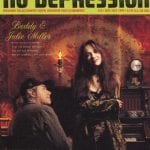Bob Childers – Travelin’ Woody’s road
It’s Sunday afternoon during the final hours of the five-day Woody Guthrie Folk Festival in Guthrie’s hometown of Okemah, Oklahoma. Bob Childers has spent the better part of the week holding court with everyone from journalists to polite town folks, members of the Guthrie family, fellow musicians, and devotees of the Guthrie legacy that the well-spoken songwriter has had a large role keeping alive in Oklahoma.
Just as he is about to start on another story, I whisk him away to talk about how an adopted Okie became the fulcrum for what is now often called “red dirt” music — a loose description of a ragtag bunch of Oklahoma musicians and songwriters who revere Guthrie and his influence on three generations of songwriters.
Childers is not one to cast himself in such a light, but it’s no coincidence that his songs have been at the heart of this scene ever since ex-Okie and current Austinite Jimmy LaFave told him to “go get your guitar and play” some 20 years ago when Childers dropped in on LaFave at his Stillwater bar, Up Your Alley. Few outside of Oklahoma have heard Childers’ considerable catalog of songs, but Louisiana’s Binky Records has released three of his albums in recent years: Nothin’ More Natural and Circles Toward The Sun (both 1997) and Hat Trick, which came out in June.
The new album rings with a simplicity that is hard to ignore, especially on the playful “Just Like Tom Skinner’s Blues” and “Outlaw Band”, which celebrate some of his Okie musical contemporaries. Childers’ songwriting style is straightforward yet deeply moving; his world-weary wisdom still allows optimistic belief in better days ahead. He’s part wide-eyed Okie mystic, part Guthriesque down-to-earth populist.
“I have lived in Oklahoma for most of my life so I sure am as Okie as you can get,” Childers says. Refugees from the great West Virginia flood of 1954, Childers’ family moved to Ponca City, Oklahoma, before he began high school. But it wasn’t until he moved to the music-friendly college town of Stillwater that he developed his love for the state’s songwriting heritage. “I hung out in California for a time in the early 1970s; I even took some classes at Berkeley, but frankly the music scene there didn’t do much for me,” he recalls. “My brother’s friend told me that Stillwater was a cool music town, so I just went back to Oklahoma and settled there.”
Although LaFave has become probably the best-known disciple of the red dirt scene, Childers is its zeitgeist. “Bob has touched everyone that has ever gone through Stillwater,” says the Red Dirt Rangers’ John Cooper, “from LaFave to Tom Skinner to Greg Jacobs to our band, and even Garth [Brooks] and more recently the guys in the Great Divide.”
After spending the ’70s and early ’80s in Stillwater, Childers moved to Nashville, then reunited with LaFave in Austin for a spell before returning to Oklahoma as the ’90s began. Since moving back, Childers has written his best songs, including the powerful “Woody’s Road”, one of the best songs ever written about the state’s greatest songwriter and a staple of the annual Guthrie festival in Okemah.
Not one to seek the brass ring, Childers writes songs simply because he has to — and because he thinks songs can inspire. “I never will write or sing a song that has a negative conclusion,” he says. “I think songs are either lived by someone somewhere, or will be. They are that powerful, and I am not gonna throw that song in the pond and watch the ripples if it’s not something that is positive.”




